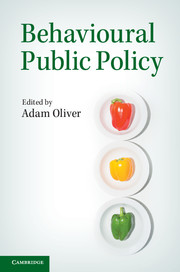Book contents
- Frontmatter
- Contents
- List of Figures
- List of Tables
- List of Contributors
- Introduction
- 1 Ambiguity aversion and the UK government’s response to swine flu
- 2 Models of governance of public services: empirical and behavioural analysis of ‘econs’ and ‘humans’
- 3 From irresponsible knaves to responsible knights for just 5p: behavioural public policy and the environment
- 4 The more who die, the less we care: psychic numbing and genocide
- 5 Healthy habits: some thoughts on the role of public policy in healthful eating and exercise under limited rationality
- 6 Confessing one’s sins but still committing them: transparency and the failure of disclosure
- 7 How should people be rewarded for their work?
- 8 Influencing the financial behaviour of individuals: the mindspace way
- 9 Decision analysis from a neo-Calvinist point of view
- Index
- References
7 - How should people be rewarded for their work?
Published online by Cambridge University Press: 05 June 2014
- Frontmatter
- Contents
- List of Figures
- List of Tables
- List of Contributors
- Introduction
- 1 Ambiguity aversion and the UK government’s response to swine flu
- 2 Models of governance of public services: empirical and behavioural analysis of ‘econs’ and ‘humans’
- 3 From irresponsible knaves to responsible knights for just 5p: behavioural public policy and the environment
- 4 The more who die, the less we care: psychic numbing and genocide
- 5 Healthy habits: some thoughts on the role of public policy in healthful eating and exercise under limited rationality
- 6 Confessing one’s sins but still committing them: transparency and the failure of disclosure
- 7 How should people be rewarded for their work?
- 8 Influencing the financial behaviour of individuals: the mindspace way
- 9 Decision analysis from a neo-Calvinist point of view
- Index
- References
Summary
The orthodox view
Recently, I met a couple. Joan has a management education and is employed as a human resource manager by a large international insurance firm with about 30,000 staff. George studied economics and now manages a well-respected family-run car dealing firm with fifteen employees in three locations.
When I talked to them about their professional activities, both emphatically stated: ‘People should be paid according to their performance.’ Indeed, it was absolutely clear to both of them that performance pay induces people to work. Performance pay means that targets are fixed ex ante, and that those exceeding them get a bonus. Those not meeting the targets should be reprimanded or dismissed. In the case of George, each car sold should lead to a higher pay; in the case of Joan, those performing better than the target set should receive a higher salary. However, she did not tell me how ‘performance’ should or can be determined in the insurance business, except in relation to the direct selling of insurance contracts.
- Type
- Chapter
- Information
- Behavioural Public Policy , pp. 165 - 190Publisher: Cambridge University PressPrint publication year: 2013
References
- 5
- Cited by



